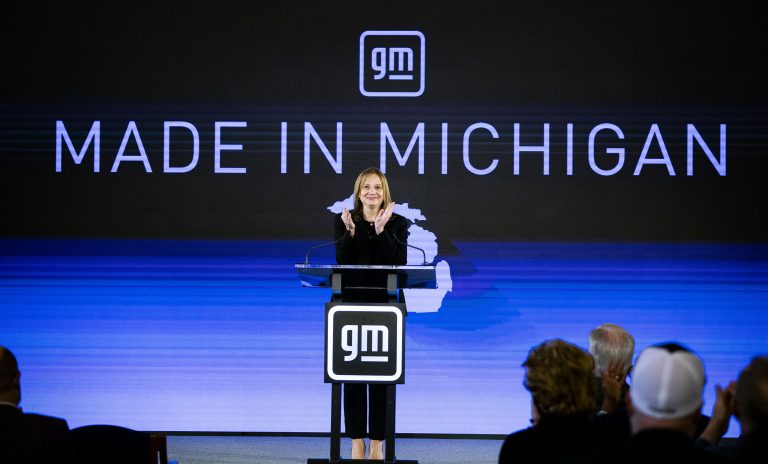Since 2017, Mary Barra, CEO of General Motors (GM), has remained confident that the automaker will beat out Elon Musk’s Tesla in the electric vehicle (EV) market by 2025, despite Tesla’s huge lead.
Barra’s vision
Barra, who was appointed CEO of GM in 2014, met with top executives of the automaker on Sept. 17, 2017. In a showcase at GM’s tech campus in Detroit, the executives envisioned how they could rival Tesla, as well as other competitors like the Ford Motor Company, in the EV market.
As GM announced its hopes for an “all-electric” future, the following week after the showcase saw the company’s stock rise more than 11 percent to about $45 a share. While this lasted only a few months, the gains would embolden GM’s resolve.
In 2021, GM said it would work towards investing $30 billion in EV’s by 2025, using the funds to rework existing plants and build new battery plants in the United States. They also plan to release 30 electric models to the world, including the GMC Hummer EV.
“No one has as many vehicles as we are going to have by 2025,” Barra told CNBC in January.
Success
You are now signed up for our newsletter
Success
Check your email to complete sign up
However, in 2022, GM is still lagging behind Tesla in the EV market — the latter is dominating with 66 percent of the U.S. market, while GM has a meager six percent.
Including vehicles produced with Chinese joint ventures like SAIC-GM-Wuling, it’s estimated that GM has scored eight percent of global EV sales.
According to Fortune, Tesla is estimated to have sold more than 352,000 cars in the U.S. last year, beating Chevrolet which sold only 25,000 vehicles.
Still, Barra is convinced that GM can still beat Tesla by 2025.
READ MORE:
- Hyundai Slowly Catching Up to Tesla as EV Sales Soar
- Two Women Rented an EV for a 2,000-mile Road Trip, and It Was a Nightmare
- Tesla Expected to Lose Throne to Volkswagen as World’s Largest Electric Vehicle Maker: Bloomberg
GM’s growth
Having a disastrous experience in 2009, when more than 120 people died after losing control of GM’s older-model cars, Barra pivoted aiming to make GM “leaner.”
She cut manpower at the company to 157,000 employees, and pulled GM out of several world markets, including Australia, Europe and Russia — a controversial move that diminished the company’s reputation amongst politicians and the United Auto Workers
From there, Barra noticed the changing industry around her, with Tesla gaining more ground, and ride-hailing companies like Uber and Lyft threatening to make automakers irrelevant, by making personal ownership of a vehicle, for many, a thing of the past.
Barra hoped to “lead the transformation,” beginning with an executive trip to Silicon Valley in 2015 to meet with Apple CEO TIm Cook, Google officials and others.
“We needed a fundamental change in some of the businesses we participated in,” GM President Mark Reuss said in an interview.
After studying the potential obstacles in its business, GM made its plans to focus on EV’s and to directly compete with Tesla. In 2016, this led to GM beating Musk with sales of their Chevrolet Bolt model, but not without hurdles.
Ultium — a platform for change
In 2017, GM began work on a secret project to help boost production of the company’s EV’s. The platform — known as Ultium — would produce EV’s with GM’s batteries already built into their frames.
“When we started architecting Ultium, we really took a big leap,” Reuss said. “That was the beginning of how to put together a plan to do it and transform to an all-electric future.”
To this day, GM remains devoted to making Ultium the driving force to push sales for the company, while other automakers are either not ready to produce EV’s or are not big enough. In 2021, GM began production in its first plant with the new technology, starting with the Hummer EV.
The company is expected to become the first automaker, after Tesla, to bring out lithium-ion batteries in the United States.
However, GM’s stocks plummeted to under $35 a share, followed by concerns of a recession and mounting competition with Ford and Hyundai.
Even as Tesla continues to rule over the EV market, EV sales are still below 10 percent of total auto sales in the U.S., leaving Musk vulnerable to the competition.
GM is expected to be the first automaker to rival Tesla in EV sales, due to the company’s size and Ultium platform. However, according to research firm LMC Automotive that day is not expected to come until 2029.
















